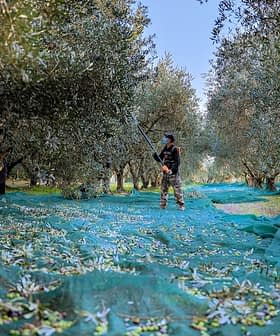Spanish Olive Oil on Final List of Retaliatory Tariffs on E.U. Goods
Along with some Spanish olive oils, certain types of table olives from both France and Spain will also face a 25 percent tariff on U.S. imports. Olive oils from Italy, Portugal and Greece will be unaffected.
 Freighter off Valencia, Spain
Freighter off Valencia, SpainThe United States Trade Representative (USTR) published its complete list of retaliatory tariffs on European Union imports on Wednesday.
The USTR will submit the list, which includes additional duties on $7.5 billion worth of E.U. goods, to the World Trade Organization (WTO) for approval on October 14. The WTO’s final decision cannot be appealed.
The fact that USTR decided not to impose tariffs on any olive oils imported from Italy, Greece, Portugal or France, nor on bulk olive oils imported from Spain, is certainly welcome news for American consumers.
Starting October 18, imports of some Spanish olive oils as well as certain types of Spanish and French table olives will face a 25 percent tariff. Olive oil and table olive imports from other E.U. countries will not be affected.
Imports of Spanish virgin and non-virgin olive oil in all of its fractions in containers of less than 18 kilograms (39.7 lbs) will be subject to the tariff. Pitted and unpitted green olives in saline solution from both Spain and France will also be hit with the American countermeasures.
See Also:Olive Oil Trade NewsThe tariffs stem from a WTO decision earlier this year, ruling that the U.S. could retaliate against certain E.U. member states for their illegal subsidies to plane manufacturer Airbus. The WTO ruled that these subsidies hurt rival American manufacturer Boeing.
Originally the USTR said it wanted to impose a 100 percent tariff on $15 billion of goods. However, the WTO ruled that the U.S. could only impose countermeasures on half of this amount.
Joseph R. Profaci, the executive director of the North American Olive Oil Association (NAOOA), a trade group that petitioned the government against the tariffs, told Olive Oil Times that the limited exposure of olive oil to the American countermeasures comes as relatively good news for importers and consumers.
“The fact that USTR decided not to impose tariffs on any olive oils imported from Italy, Greece, Portugal or France, nor on bulk olive oils imported from Spain, is certainly welcome news for American consumers,” he said. “The USTR apparently heard our concerns about the health benefits of olive oil and the critical role Europe plays in meeting demand in the U.S.”
Profaci added that while the 25 percent tariff on packaged Spanish olive oil will still have an adverse impact on importers and consumers, the USTR’s decision to not impose the full 100 percent tariff is a good sign for the industry.
“I am optimistic that USTR’s decision to limit the tariffs to 25 percent instead of the 100 percent (which would be within its rights under WTO rules) is a good faith indication of its desire to negotiate a settlement with the E.U.,” he said. “We will be doing what we can to facilitate such a settlement to get all olive oil off the list.”
According to data from Eurostat, Spain has already exported 104,705 tons of olive oil to the U.S. in the 2018/19 marketing year, which represents about one-third of all American olive oil imports. Meanwhile, the rest of the E.U. has exported a combined 92,700 tons of olive oil to the U.S. this market year.
Spain’s Association of Young Farmers and Ranchers (ASAJA) has called on both their government and the European Commission to apply pressure to the U.S. in order to try and avoid the implementation of tariffs.
In a rare public statement, Pedro Barrato, the president of ASAJA, criticized the WTO’s decision and said it was absurd that agri-food products should bear the brunt of American retaliation on aircraft subsidies.
“We cannot allow our agriculture to be a currency in trade agreements with third countries,” he said. “It is paradoxical that it was decided to sanction agri-food productions with a 25 percent tariff as a result of community subsidies to Airbus and the tariff for aeronautical products is only 10 percent.”
While some olive oil producers in Spain will be breathing a sigh of relief that the tariffs were not as bad as they could have been, Spanish olive growers will be hit significantly harder. Table olive producers in Spain have already lost an estimated $50 million in revenue from unilateral tariffs that the U.S. imposed on Spanish black olive imports last year.
The Olive Growers Council of California applauded the USTR for including Spanish and French green olives on its list. Mike Silveira, the chairman of the OGCC, said that the decision underscored the U.S. government’s commitment to California’s table olive producers.
“The retaliatory tariffs announced [Wednesday]… further underscore the Administration’s continued commitment to strong trade enforcement, and, in the case of olives, help protect the integrity of the U.S.-grown-and-processed ripe olive industry,” he said.
However, Cecilia Malmström, the outgoing European trade commissioner, warned that the U.S. should be careful how they implement their tariffs. The WTO is set to make a similar ruling later in the year, which many expect will allow the E.U. to impose its own tariffs on the U.S. for illegal subsidies provided to Boeing.
“Applying countermeasures now would be short-sighted and counterproductive,” Malmström said. “In the parallel Boeing case, the E.U. will in some months equally be granted rights to impose countermeasures against the U.S. as a result of its continued failure to comply with WTO rules.”








